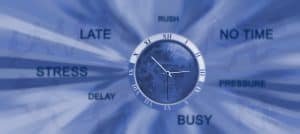6 Tips To Avoid Burn-Out

There is no getting around it: teaching takes energy. Lots of it. It takes mental, physical, and emotional grit. It takes organization, determination, and endless exertion. It takes wisdom, compassion, and discipline.
And that is just to get through the first 10 minutes of the day.
Teachers have to wear many hats: teacher, philosopher, advisor, counselor, medic, surrogate parent, protector… the list goes on and on. They are not only educated in their area of expertise, but they know how to adapt lessons, shift gears when a strategy isn’t working, tutor students who fall behind, and much more. They are overworked, underpaid, and undervalued.
But they still teach. Not only do they teach, but they also help their schools in extracurricular activities such as sports, fine arts, and fundraisers. They give, and give, and give more. While doing all of it, some have families, some have second jobs, and some may even be taking extra classes online to help better themselves. And now, with new guidelines being established in schools due to COVID-19, it isn’t getting any easier.
Does it sound exhausting? It should. It is.
All of this “doing” promotes a sense of overburden and burn out. You may not be a teacher, but you could be entering the same danger zone. The big question is: How can you avoid burn out?
1. Find An Example
Find someone where you work who has been doing their job longer than you and displays energy, creativity, and overall joy while engaged at their job. That doesn’t mean they don’t have any bad days, but overall they seem well-equipped to continue in their job indefinitely. Once you find that person, get nosey. Have coffee or lunch with them. Discover what their habits are outside of work. Confide in them. If you are feeling overwhelmed, irritable, mentally exhausted, or at the end of your professional rope, tell them about it. Ask for advice. They might be able to give you some tips that will help preserve some sanity and energy in your day.
2. Take Care of Yourself
Self-care isn’t being selfish. You cannot operate at your peak if you are worn down to shreds. Going to bed earlier isn’t a sign of weakness. Indulging in reading a book for fun isn’t a waste of time. Getting a massage, a pedicure, a manicure, or simply taking time to enjoy a long, luxurious bath isn’t a frivolous venture. Examine your body. Are you tired? Get more rest. Are you anxious? Maybe you need to work in some walking time to prompt endorphin production. How are your eating habits? Are you turning to sugary, fatty snacks for comfort? Self-care is about making sure your mind and body are able to handle the demands of the day. As a teacher, I owe it to my students and family to take care of myself. I will be a better teacher, wife, and mother.
3. Learn to use the word “No”

Photo courtesy of annca on Pixabay
Taking better care of yourself means you will probably have to say “no” at some point to someone. I like to say “yes” to people. Some of it is because I want to see good things happen. That is admirable, but not always profitable. Saying “yes” to too many activities will be a drain on your body and mind. It will cause more stress (who needs that?). It will also detract from the quality of attention you can give to those commitments already made. Examine every opportunity presented carefully. Do you really need to be in charge of decorations for the pep rally? How important is leading the science club? Are you doing it because you are compelled by a true love for the activity and you can fit it in reasonably with the rest of your commitments? Or are you doing it out of a sense of pride or pressure? Sometimes I think we take on an activity so we can think to ourselves “Hey, I saved this program because I was the only one who would step up and lead it!” Or maybe we like to play the martyr: “Poor little ol’ me, I’m so worn out because I’m doing everything!” Be careful how you think about opportunities. Many times new projects and tasks are taken on for buried, selfish reasons. We are very good at fooling ourselves into thinking we do what we do for more altruistic purposes.
4. Recapture the Joy
There is a reason teachers choose their profession. There is a satisfaction in it that surpasses all negativity. Teachers love to help students learn and grow as people. Teachers see the potential in young people and try to cultivate it. The best part is that teaching is never dull. There is always a puzzle to solve because students learn so differently. Many times a lesson has to be presented in different ways in order to help them learn. The classroom is a place of innovation, instruction, guidance, encouragement, and creativity. Recapture those things, instead of simply crossing off days until the next break.
5. Get Some Grit In Your Craw
Some what in your what?
Here’s a little lesson in the origin of phrases. Despite what you see in the movie Chicken Run, birds and foul don’t have teeth. Instead, they have a gizzard, also called a “craw” in their throats. They fill it with gravel, small stones, or sand. In short: grit. The grit helps break up food for digestion. The term “grit in your craw” is meant to represent fortitude and perseverance. Sometimes you can’t recapture the joy right away. Sometimes you have to fake it till you can make it happen, as the saying goes. This is where grit comes in. Having grit means you have the ability to press through those times when you don’t think you can endure. Until you are able to make personal changes to get off the road to burn out, get some grit in your craw.
6. Make Boundaries
This is my best piece of advice: Don’t bring your work home. As a teacher, I always have paperwork to catch up on. Tests, quizzes, essays, and papers are continually deposited in my inbox for me to correct. The pile can be daunting, and I get tempted to take it home to catch up on. But I don’t. I leave it in my office at school because when I leave the building, I have other facets of life that need my undivided attention. Family, grad school work, writing, exercising, or taking some self-care time all have a time and place. Bringing work home would be an infringement on that arrangement and throw things out of balance. That doesn’t mean that on some days I won’t stay a little later to finish up a chunk of work, but it never comes home with me. Find a boundary and stick to them. That will give you a sense of compartmentalization and balance in your daily life.
Dealing with stress to avoid burn out is not only possible but necessary. Giving up because you are overwhelmed is selfish and short-sighted. Find ways to make changes that will be beneficial for you personally and professionally. Balance in life is the key to happiness, success, and sanity, and no matter what your daily life looks like, the balance must be found and preserved.















